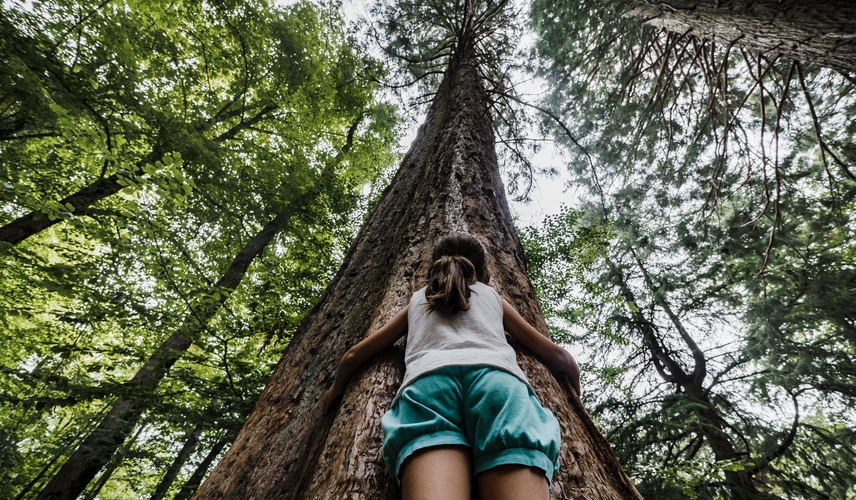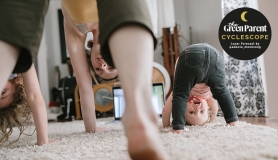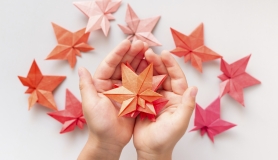We celebrated my eldest daughter’s fourth birthday with a house party: a dozen children from her pre-school, pass-the-parcel, musical bumps, and a wonky but recognisable rabbit-shaped cake. Afterwards, we dished out the party-bags and took stock of the losses (one grazed knee, one wet-trouser incident, a couple of tantrums, the usual juice puddles and crisps ground into the carpet) and gains: a veritable mountain of pink plastic presents.
She did receive one or two nice storybooks, but these were pushed aside in favour of pastel-coloured ponies with synthetic manes and tails to brush, Frozen playsets, plastic princess jewellery. I wondered, at this tender age, has she already been lost to consumerism, to fashion, to an unsustainable, disposable lifestyle? Was this her natural inclination or have I led her down this path? Will the same thing happen to her newborn sister? And is it reversible? Are children born green?
In an attempt to answer this, I thought I’d weigh my children up (completely subjectively) against the Worldwatch Institute’s top ten ways to be green.
1. Save energy. Give my children (aged four, two and six months) the choice between a toy that takes batteries and a toy that doesn’t, I estimate that 90% of the time they’d go for the electronic version (and preferably the one that eats juice the quickest, takes the most obscure size of batteries, and requires the tiniest screwdriver to replace them). However, give them a choice between a toy that sings songs, flashes lights and dances the hokey-cokey, or an actual sing-song on my knee with plenty of bouncing and turning them upside-down, my triceps would get a workout every time. So maybe it’s interaction they crave, not necessarily bright lights and American accents. On the other hand, they will go to incredibly inventive lengths to build a pile of furniture so that they can climb up and switch on a light, whereas I have never ever seen them bother to turn one off. Born green score: 5/10.
2. Save water. My children love water. Bath-time, swimming lessons, watering the garden when it’s already raining, you name it! However, I’m not sure that loving water equates to saving water… They seem to get a lot more fun from emptying the paddling pool all over the already-sodden lawn than from actually paddling in it. Born green score: 2/10.
3. Save fuel. I don’t know many children that enjoy being constrained. Particularly in a five-point harness in a tight chair inside a metal box moving at 60 mph in which they can’t play with their toys because they keep dropping them, can’t read because it makes them feel sick, can’t watch TV because there isn’t one, and can’t listen to The Little Mermaid audiobook more than five times in succession without Mummy having a breakdown. My youngest, in particular, just screams when she catches a glimpse of a car seat, which is definitely an encouragement to walk or cycle the nursery run. Born green score: 9/10.
4. Eat smart. By this, the Worldwatch people mean eat less meat, eat local, eat organic, and eat sustainable. Although we do eat a largely vegetarian diet, bizarrely our children seem to be big fans of red meat. Perhaps it’s a novelty for them? Perhaps we don’t feed them enough apricots or spinach to meet their iron requirements (which is hardly my fault when my daughter refuses to touch anything with ‘green bits’ in)? They simply can’t get enough spaghetti bolognaise. This has led me to some crafty switches – they don’t seem to notice if I use lamb mince instead of beef, or substitute half the mince with lentils, or even grated carrot! I blame my cheese-obsessed husband for the fact that they are also huge fans of dairy, in all its forms (cheese, yogurt, ice cream, buttercream icing…). Local, however, is definitely their thing – the baby will happily eat grass from the back lawn, or a ticket for the local bus; the four year old was once found happily crunching on a snail in a pub garden. Born green score: 4/10.
5. Skip bottled water. Given the choice, the four-year-old would never drink water of any kind, bottled or otherwise. She’d always opt for a carton of juice, or anything with a pink straw. The only times she’ll ask for water are if Mummy is drinking it (from a reusable bottle, I hasten to add), or at bedtime when she thinks it might delay lights out. I’m not sure she even knows they sell water in bottles, and who knows, by the time she grows up maybe they won’t! Born green score: 7/10.
6. Think before you buy. This one basically encourages buying second-hand over new, and here I think children really are born green. They simply couldn’t care less whether their ‘new’ clothes are brand new with the label still on, or were passed down from their sister who received them from their second cousin who was given them by the girl down the road who had them when their sister had grown out of them! The great thing about young children is they tend to grow out of clothes before they’re worn out (in some instances, even before they’re worn at all). And the great thing, as far as my daughters are concerned, is that they get way more Peppa Pig stuff from their cousins than I would ever countenance buying. They don’t even have to go shopping – and no-one likes being dragged around Primark on their weekend. Plus, Mummy tends not to mind if they get things covered in paint, mud or chocolate at first wearing if they were second-hand to start with! Born green score: 10/10.
7. Borrow (from libraries, friends, or neighbours). My children love going to the library and certainly love borrowing books, but I’m not sure they’ve quite got the concept of returning them yet. Said books tend to sit around on the shelf until the day they’re due to be returned, and then suddenly be declared their favourite book ever and have to be renewed and renewed and renewed. Born green score: 3/10.
8. Buy smart. This generally entails choosing high quality items that last. i.e. not the cheap plastic toys that come free with magazines or children’s meals and inevitably fall apart or leave a trail of slime all over the sofa… Born green score: 1/10.
9. Keep electronics out of the trash. If this includes not shortening the lifetime of most electronic items by repeatedly dropping them, smearing them with jam, jumping on them, or eating them, then children definitely weren’t born with sustainable instincts. Even when you give them your smashed-up iPhone to play with they somehow immediately know it’s a cast-off and turn their attention straight on to your new one. This is one instance where second-hand just doesn’t seem to cut it with the kids. Born green score: 0/10.
10. Make your own cleaning products. Er, yogurt and saliva floor cleaner, anyone? While my children haven’t yet shown much interest in de-carbonising the oven with vinegar and bicarbonate of soda, on the plus side they really don’t care if the house is clean or not! Born green score: 5/10.
Overall I scored my children a mediocre 46/100 for a predisposition to greenness, according to these measures. That might not sound much, but it’s still 46% that we can harness, and build upon. Children certainly seem to have an inbuilt attraction to soil (well, dirt), flowers, minibeasts and larger beasts. However they also seem to have a natural inclination to pick it, eat it, or otherwise destroy it. How can we build upon the former while gently discouraging the latter? My guess is by taking the time to look at and learn about nature in situ. If I’m always rushing them on past the beetle or the dandelion to get to school, it’s no wonder they want to bring it with them! Children are full of wonder if we take the time to channel it. They really would prefer to go out and look at the stars than sit inside in front of the TV. They’d love to grow, pick and pod their own peas instead of defrosting some from the freezer. Is there anything better than fresh home-grown peas?
While children at first glance seem to be naturally wasteful – asking for one type of cereal then refusing to eat it and demanding another – at the same time they are natural hoarders. Just try throwing away one of those free plastic toys that they haven’t played with for weeks and you can guarantee you’ll know about it! But perhaps the most important characteristic to build on is their generosity. My three are always wanting to give, to share. Instead of picking up one autumn leaf and putting it in her pocket, the four-year-old will always make sure she collects six – one for everyone in the family and one for her best friend.
I believe we can gradually nurture and extend that natural generosity to encompass the world around us, the environment that we can see on TV or read about in books as well as the nature in our back garden; the people we don’t know or who aren’t even born yet. Together we can bring up children that are capable of working with the planet, accepting our fundamental dependence on it and our responsibility to it. Although I’m not sure I’m ever going to succeed in stopping them from using reams and reams of loo paper…
What do you think? Are children eco-warriors by nature or is it something we have to teach them?
Alex is a botanist, writer and mother of three based on Scotland. Her middle child, Benjamin, was born profoundly disabled and she blogs about him at www.thelongchain.wordpress.com. When life permits, she also loves to potter around in her vegetable garden. Follow her on twitter @thelongchain.







